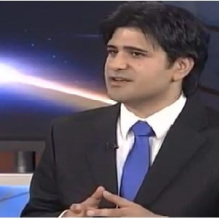International Dignitaries Rally for a New Iran Policy, Support NCRI as Democratic Alternative


By Dr. Majid Rafizadeh
For decades, Iranian politics has been predominantly characterized as a competition between the hard-liners’ political camp and the moderates or the reformists. But, since the hard-liner Ebrahim Raisi became president in August, a new phenomenon is emerging in Iran’s political system: The hard-liners are turning against one another.
Although Raisi has been in office for fewer than 100 days, the Kayhan newspaper — a mouthpiece for the Office of the Supreme Leader and whose editor in chief is a close adviser to Ali Khamenei — has already begun criticizing the president due to the state of the economy and rising prices. Kayhan would not be likely to criticize Raisi without the approval of the supreme leader.
While Khamenei and his circle appear to be repeating the supreme leader’s underlying modus operandi, which is dodging responsibility by throwing blame on the “government,” a.k.a. the president and his team, such an act is unprecedented when the president has been in office for such a short time.
It is also worth noting that the idea that Iran’s supreme leader is against the government is totally absurd. The government and Khamenei are not two distinct entities; Khamenei is the government. He is the final decision-maker on Iran’s domestic and foreign policy. There is no critical policy or law that passes without the blessing, order or approval of Khamenei. He manages the economy and holds the nation’s wealth and natural resources. He, his family members, his gilded circle, and the senior cadre of the Islamic Revolutionary Guard Corps are among the wealthiest people in Iran.
Other influential members of the hard-liner political camp are also turning against each other. For example, the hard-liner Parliament Speaker Mohammed Bagher Ghalibaf, who ran for president but lost to Raisi, this month lashed out at the president, stating that the administration is “an incompetent government with inefficient managers.” He added: “Wrong beliefs and inefficient managers are two problems in our governance. The problem is not lack of money and resources. We must invest time and energy for these things.”
This clearly demonstrates an unprecedented rift in Iran’s hard-line political camp. Such criticisms coming from hard-liners against their own followers highlight the fragility of this faction. As the Iranian Students News Agency stated: “But do his (Ghalibaf’s) criticisms not reflect back on him and his political faction now that an administration close to his political faction is in office and when some of his close associates are in management posts?”
Hard-liners used to have a scapegoat when the so-called moderates or reformists held some of the most powerful positions in the executive branch or dominated Iran’s Parliament. The hard-liners would point a finger at these political camps for causing the nation’s domestic or foreign problems.
But the regime’s top leaders failed to see that one of the unintended consequences of giving hard-liners control of all the branches of power — the executive and legislative, as well as the judiciary — would be the exposure of the system’s weaknesses.
In 2020 and 2021, the regime orchestrated a plan that would allow hard-liners to take over parliament and the presidential office. First, Khamenei’s political arm, the Guardian Council, disqualified more than 7,000 candidates, mostly from the reformist, independent and moderate political movements, ahead of last year’s parliamentary elections. As a result, hard-liners took over the Majlis. Soon after, 230 lawmakers out of 264 voted for Ghalibaf, a former general and senior IRGC figure, to be speaker. Then, in 2021, the regime orchestrated another sham election, with the Guardian Council disqualifying any presidential candidate, reformist or moderate, who appeared to be a viable rival to Khamenei’s favored choice, Raisi. The new president has, in turn, appointed top hard-liners, including former members of the IRGC, to the Cabinet.
Now that the hard-liners are in full control, they have no one to throw the blame on for the people’s dire financial situation except their own political camp. In recent months, retired government employees have staged more than a dozen protests, each spanning multiple cities. The regime has offered little to no response to their demands for an economic policy that shrinks the gap between their stagnant income and the rising cost of living. Life in Iran has become unbearable, economically and politically, and this could trigger a nationwide uprising at any time. Inflation is at its highest level since the establishment of the regime.
The rift in the hard-liners’ political camp — the first since the establishment of the regime — shows the fragility and weakness of the theocratic establishment of Iran.

This article was first published by arabnews
Comments
Post a Comment